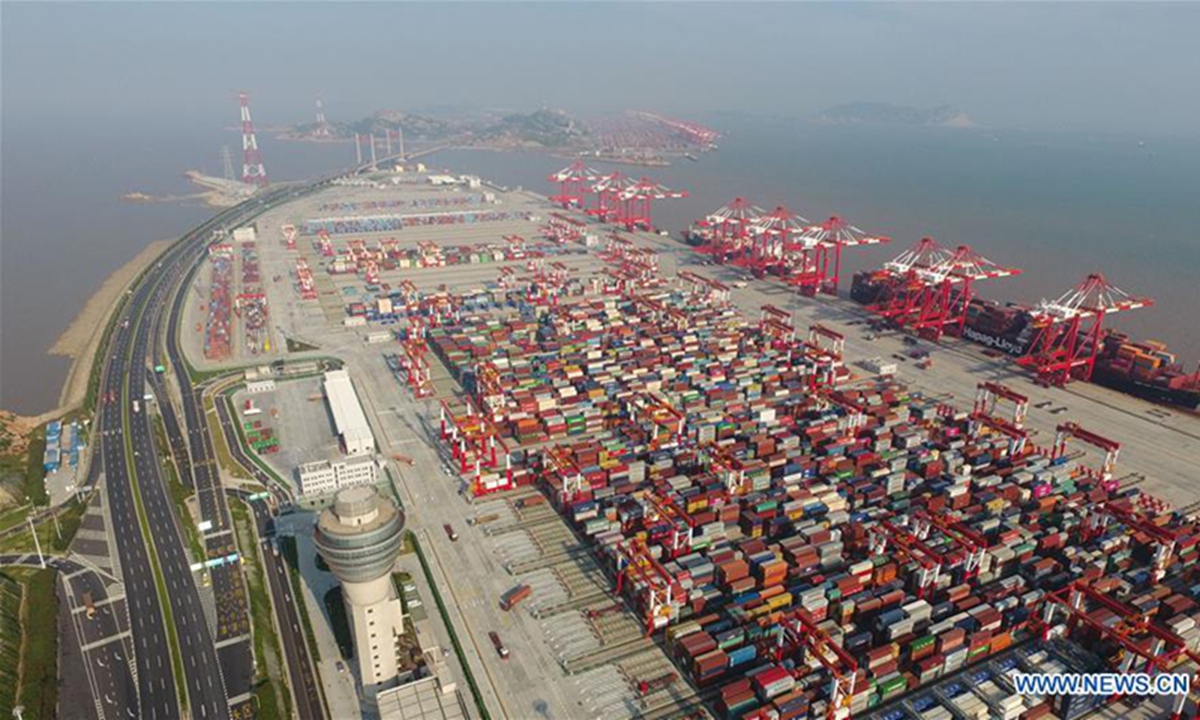
Aerial photo shows the Yangshan Deep Water Port, an automated container terminal, in East China's Shanghai. File photo: Xinhua
The first Pudong Shipping Week, focusing on the shipping industry's green, low carbon and digital transformation, kicked off in Shanghai on Monday. The six-day event aims to provide a platform for industry cooperation and communication among upstream and downstream participants so as to deepen the city's development as an international shipping center.China has been committed to pushing forward with its opening-up agenda while strengthening economic and trade cooperation with the rest of the world. As China's top economic and financial center, Shanghai plays an important role in this process.
As an important part of Shanghai's construction of the "five centers" - the international centers of the economy, finance, trade, shipping, and science and technology innovation - building Shanghai into an international shipping center is a major way for China to enhance its opening-up, which will be of great strategic significance to promoting the upgrading of the local shipping industry and strengthening global cooperation in the shipping sector.
Shanghai's construction of an international shipping center has already achieved results. Shanghai has built the world's biggest and most automated container port after years of development.
In 2022, the container throughput of the Shanghai Port exceeded 47.3 million 20-foot equivalent units (TEUs), remaining the world's busiest container port for the 13th straight year, despite the pandemic and geopolitical pressure, according to Shanghai International Port (Group) Co, the port operator.
Nonetheless, the construction of Shanghai as an international shipping center still leaves a lot to be desired. The shipping sector is one full of competition in terms of global capital, technology, information and talent. This is also why the rise of Shanghai's shipping prowess requires not only infrastructure, but also soft power like shipping services and financial support.
For instance, while Shanghai Port is already the world's largest container port, it still lags behind cities like Singapore and London in terms of certain roles in the global shipping sector.
London may not handle as much cargo as Shanghai or other cities, but it retains a unique role in the global shipping industry with a comprehensive shipping services system that includes institutions like the Baltic Exchange.
Moreover, a crucial indicator for an international shipping center is its volume of global transshipment. According to Shanghai International Port (Group) Co, international transshipment container throughput accounted for about 12 percent of Shanghai Port's total container throughput in the first half of this year, a relatively low level compared with Singapore and other shipping cities.
With global trade facing challenges ranging from geopolitics to climate change, which also affect the world shipping industry, it is essential for Shanghai to establish a strategic direction for the construction of a global shipping center, focusing on improving both its hard and soft power.
Shanghai has never stopped making progress over the years. In August, China launched its first Containerized Freight Index (Europe Service) Futures on the Shanghai International Energy Exchange (INE), a subsidiary of the Shanghai Futures Exchange, according to the Xinhua News Agency.
This is the first shipping futures product in China, reflecting freight rates for containers shipped from Shanghai to European ports, which is expected to boost the high-quality development of the international shipping industry and advance the opening-up of China's futures market.
Last month, China's first domestically made large cruise ship was formally delivered, a breakthrough in China's shipbuilding technology and international cooperation with relevant industrial chains.
All this progress couldn't have been achieved without cooperation with the global shipping industry chain and strengthened collaboration among various regions.
The continuous improvement of the global operation capacity of China's shipping industry through high-level inter-regional cooperation will contribute to safeguarding smooth and stable global supply and industry chains.



